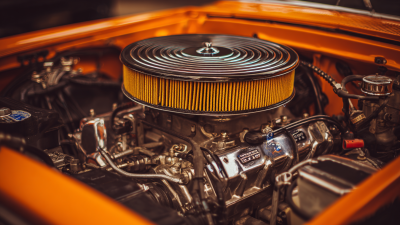In the pursuit of improved air quality within vehicles, the importance of the cabin filter cannot be overstated. According to a report by the Environmental Protection Agency (EPA), indoor air quality can often be significantly worse than outdoor air quality, highlighting the critical role that cabin filters play in safeguarding health. With studies showing that effective cabin filtration can reduce particulate matter by up to 90%, optimizing your cabin filter procurement strategy is essential for both consumer satisfaction and regulatory compliance. Additionally, the global automotive cabin air filter market is projected to reach $7 billion by 2025, emphasizing the growing recognition of their importance. By implementing strategic procurement practices, companies can ensure they provide high-quality cabin filters that not only enhance air quality but also meet the increasing demands of eco-conscious consumers.

When selecting cabin filters for enhanced air quality, several key factors must be taken into account to ensure maximum effectiveness. First and foremost is the type of filter material used. Studies, such as the one conducted by the World Health Organization, indicate that particulate matter can significantly impact respiratory health, making HEPA (High-Efficiency Particulate Air) filters a preferred choice. These filters can capture at least 99.97% of particles that are 0.3 microns in size, including dust, pollen, and smoke, contributing to cleaner air inside vehicles.
Another critical factor is the filter design and compatibility with the vehicle’s HVAC system. According to a report by the American Society of Heating, Refrigerating and Air-Conditioning Engineers (ASHRAE), the design of cabin filters can greatly influence airflow and filter efficiency. Filters that are specifically engineered for the make and model of the vehicle not only optimize performance but also prolong the lifespan of the filter. Furthermore, regular maintenance and replacement of cabin filters—recommended every 12,000 to 15,000 miles—can significantly reduce the presence of airborne contaminants and allergens, thereby improving the overall air quality for occupants. Maintaining these standards is not just a matter of convenience; it's vital for health and well-being in today's increasingly polluted environment.
When it comes to cabin filter procurement, avoiding common pitfalls can significantly enhance air quality and vehicle performance. One prevalent mistake is underestimating the importance of filter quality. According to the Global Automotive Cabin Air Filter Market report, high-quality filters can reduce particulate matter by up to 95%, improving passenger comfort and health. Choosing cheap alternatives often results in inadequate filtration and may lead to costly HVAC system repairs.

Another common error is failing to consider the specific requirements of the vehicle. Not all cabin filters are created equal; compatibility issues can diminish their effectiveness. A study by Frost & Sullivan emphasizes that tailored filtering solutions not only optimize air quality but also extend the life of the HVAC system. Procurement strategies should prioritize filters that match manufacturer specifications and consider factors such as vehicle age and local pollution levels. This targeted approach ensures that the air quality in the cabin meets optimal standards, benefiting both the vehicle and its occupants.
In today's automotive industry, the significance of certification for cabin filters cannot be overstated. The introduction of the CN95 certification is revolutionizing the market by setting new standards that enhance the filtration efficiency of cabin air filters. As consumers become increasingly aware of the detrimental effects of air pollution on health, certified filters not only improve air quality inside vehicles but also promote safer driving environments. This growing demand for quality filtration solutions is evident as the automotive cabin air filter market is projected to expand significantly in the coming years.

Moreover, as the global automotive cabin air quality sensors market is expected to grow substantially, manufacturers must prioritize compliance with rigorous standards like CN95. With a compounded annual growth rate of 12% anticipated in this sector, having certified cabin filters can differentiate brands and attract health-conscious consumers. The latest studies indicate grave concerns regarding the filtration performance of existing vehicle cabin air filters, as some show only minimal efficiency. Thus, ensuring that filters meet established certification benchmarks is critical to not only improving indoor air quality but also to enhancing overall passenger comfort and safety.
When optimizing your cabin filter procurement strategy, evaluating supplier reliability is crucial for ensuring consistent air quality in vehicles. One effective approach is to conduct thorough background research on potential suppliers. This includes checking their market reputation, customer reviews, and any existing certifications that attest to their product quality. A reputable supplier will not only provide high-quality cabin filters but also demonstrate a commitment to ethical practices and customer satisfaction.
Another key tip is to establish clear communication with potential suppliers. Engaging in open discussions about their manufacturing processes, lead times, and warranty policies will help gauge their reliability and transparency. Additionally, consider requesting samples to assess the quality of their cabin filters firsthand. This firsthand experience can significantly influence your decision-making process.
Lastly, ensure that suppliers have robust support and service offerings. This includes reliability in delivery schedules and prompt responses to inquiries or issues that may arise. A supplier that values customer relations is more likely to provide consistent quality and support over time, crucial for maintaining optimal air quality in your vehicles. By implementing these strategies, you can secure a reliable supply of cabin filters that meet your air quality standards.
When it comes to sourcing cabin filters, achieving an optimal balance between cost efficiency and quality is crucial. The first step in maximizing cost efficiency is to conduct a thorough market analysis. Understand the various options available, including brands, specifications, and supplier conditions. By comparing prices and evaluating the long-term performance of different filters, businesses can make informed choices that not only lower immediate expenses but also enhance the longevity of their air quality systems.
Equally important is the establishment of strong relationships with trusted suppliers. Engaging with reputable partners can provide access to bulk purchasing deals, ensuring high-quality filters at competitive prices. Moreover, consider collaborating with suppliers who prioritize sustainability and offer eco-friendly options. These suppliers can provide products that not only meet quality standards but also align with a company’s environmental goals. By focusing on both cost and quality, organizations can ensure superior air quality in their vehicles, benefiting both employees and customers alike.






